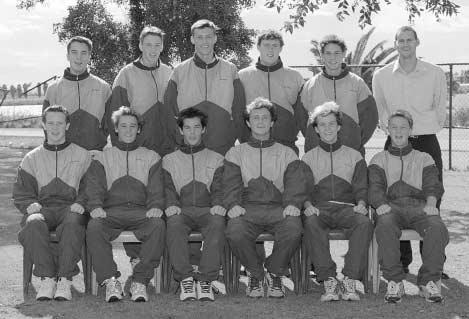
4 minute read
English and Debating Information and Communication
Academic
This year we have begun reporting in Outcome statements for the Years Eight and Nine students across all faculties of the school. The philosophy behind Outcomes based education is that it gives both the student and the parents a better knowledge of their progress in more clearly defined areas of the English Learning Area. Our faculty reports on Reading, Writing, Speaking and Listening and Viewing which are the five language modes of our Learning area. The levels go from Level One up to Level Eight. By the end of Year Twelve many students who are competent English students would have achieved Level Eight in most of those areas. We also have a number of numerical assessments throughout the year to give the students an idea of marking scales and percentage scores which they will encounter in Year Eleven and Twelve. This year the English department added more time in the Information and Communication Technology (ICT) labs with specialist staff. This was a team-teaching approach with the ICT expert and the class teacher. In Year Nine, the IT integration component was for two terms with ICT expert teachers Mr Quartermaine, the Head of LT. (Learning Technologies) and Mrs Horton, our senior Librarian, for a term each. In Year Eight, the ICT integration component was for a term with Mrs Horton. Computer literacy is a very important part of English education for the 21st century but functional literacy and critical literacy are the areas the English staff are always trying to develop and enhance in our students. Parents often ask me how they can help their sons to write better essays and to comprehend reading passages better. The answer is simple; have them engage in the writing process and in reading a range of texts as much as possible. It is the old adage ‘practice makes perfect’. Research has proven that children that are emersed in reading and writing from an early age and who see members of their family also engaged in reading and writing become proficient readers and writers. There are exceptions to this rule, however. In most cases, we quickly identify students in our classes who are having problems with their Literacy and establish some remediation of their specific literacy problem. Wehave two courses in English in Year Eight and Year Nine. Course Two is designed for the students who need that little bit of extra help with their Language skills. In Year Ten we have three courses. Course One is what we call a pre-literature course for students who are above average in their English and
who may choose to do English Literature in Year Eleven and Twelve. Course Three is for those students who need some extra help. In Year Eleven, we introduced Vocational English for the first time at the school. Mrs Marie Zwart takes this group. This course fits well into In Step and Work Studies courses. I would like to thank the teachers in the faculty for their Mr John Geekie tireless efforts in creating environments where boysHead of English learn best.
Debating
Our school was host to three divisions of the Western Australian Debating League Teams. The WADL competition consists of some 1350 students from over forty state and private schools in the metropolitan area competing in over 780 debates, which start in Term One and continue through Term Three. We had fourteen teams from Years Eight to Year Twelve competing and eight of the staff coaching those teams. The teams performed admirably, with a great deal of enthusiasm.
The most successful team this season was Mr Vaswani’s Year Eight debating team, James Atkins, Jerram Gibson, Beau Maverick and Jarrod Hoffman. Congratulations on reaching the finals. Thank you, Mr Vaswani, for your efforts throughout the season with your three teams. I would also like to take the opportunity to thank the other members of staff who coach teams in the competition. Mr Hawke and Ms Mizen have two teams while Mr Armitage, Mr Redden, Mrs Horton and Mr Nugent coach a team each. Mrs Moira Staunton also coached a team for three of the rounds before her departure to the Catholic Education Office and I would like to extend my thanks to her also. Thank you especially to the parents of our debating boys who help with ideas for their debates, come along and support their sons and week after week.
John Geekie
Head of English
SENIOR DEBATING TEAM
Back row: Thomas Duffy, Daniel Evangelisti, Michael Ford, Dominic Rose, Justin Pietracatella, Michael Sims, Thomas Hoffman Third row: Samuel Gillies, Daryl Tan, Alexander Meegan, Matthew Slack-Smith, Thomas Cox, Benjamin Creighton, Marc Ferguson Second row: Ms Sharatha Mizen, Patrick Griffin, Cameron Jansen, Laurence Coleman, David Von Felten, Brian Corr, Carmelo Crisafio, Mr Peter Hawke Front row: Matthew Bouwman, Nathan Colli, Andrew Hislop, Mr John Geekie, Peter Bradley, Long Pham, Samuel Reid,
Absent: Mr Mahendra Vaswani

MIDDLE SCHOOL DEBATING TEAM
Back row: Binuk Kodituwakku, Luke Armitage, Michael Edwards, Desmond Yeo, Brendan Brbich, Perry Joyce, Daniel Gazzard, Rowan Carville Third row: Liam Dee, Dylon Misso, Jarrod Hofmann, Beau Mavric, William Schwab, Brendan Murray, Justin Soon, Anthony Hermawan Second row: Mr Timothy Redden, Ms Sharatha Mizen, Jerram Gibson, Anthony Durand, Stephen Dale, James Redman, Brendan Harwood, Kosta Ilic,
Mrs Rosemary Horton,Mr Mahendra Vaswani
First row: Christopher Dawson, Elliot Steffanoni, Benjamin Caddy, Mr John Geekie, Samuel Metcalf, Allistair Bond, Jay Colton Absent: Luca Calligaro










